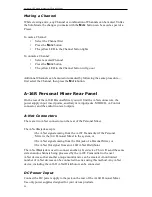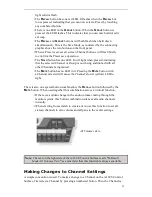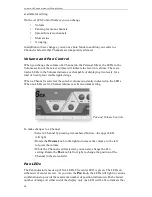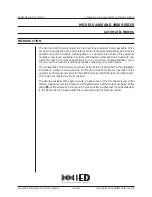
Aviom A-16 Personal Monitor Mixing System
24
25
Transmitter into a signal chain without giving up audio patching flexibility.
The Thru jacks have other uses as well. While a direct output from a mixing board
is the most straightforward way to connect audio from your mixer to the A-16T,
some mixing boards do not have this signal routing option available. In this case, the
mixer’s insert points (sometimes referred to as an effect insert
send
and
receive
) can
be used instead. When using a mixing board’s insert points to get monitor signals into
the A-16T, the Thru jack can be used to complete the insert send/receive loop used by
most manufacturers. Additional information about patching and connecting systems
appears later in this document.
The A-16R Personal Mixer
This section describes the controls, modes, and functions of the A-16R rack mounted
Personal Mixer. The basic components of the front panel include:
• Sixteen lighted Channel buttons (they are also the Preset select but-
tons)
• Channel label strip
• Recall button
• Group configuration and edit button
• Solo and Mute buttons
• Pan and Volume knobs
• Bass and Treble tone controls
• Master Volume control
• A-Net signal indicator
• Mix In volume control
• MIDI/Remote control selection switch
• Headphone jack
Operational Modes
When using the A-16R Personal Mixer, you will be in one of the following modes:
•
Mix Mode
— Here you can change Channel and mix settings such
as volume, mute, and panning; you’ll spend most of your time in this
mode.
•
Recall Mode
— Activated by the
R
ECALL
button, the row of sixteen
Channel buttons are used to select one of the sixteen available mixes
















































